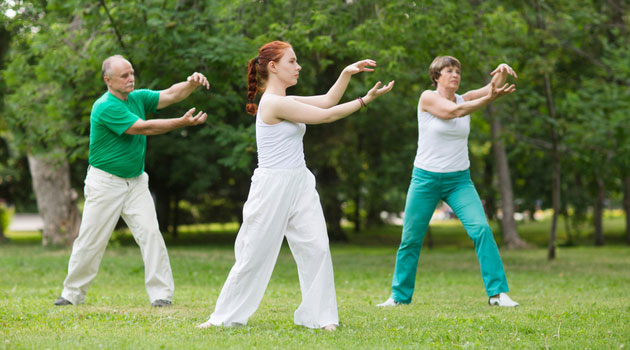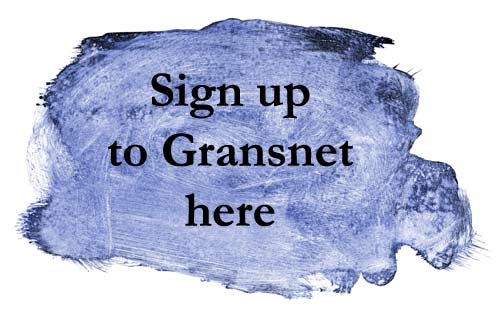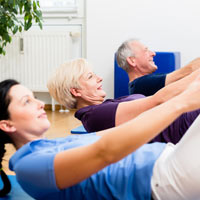Son’s girlfriend diagnosed with BPD

Tai chi for over 50s

Tai chi is a Chinese martial art that combines meditative breathing with graceful movements for a relaxing yet strengthening workout. It has now become a go-to exercise for many and has been backed by the NHS as being particularly beneficial for over 50s. Here’s an overview of the rewarding discipline, plus some tips and locations to help you find a local class when things start to return to normal.
What is tai chi? | Health benefits | Different types
FAQs | How to find tai chi classes near me
Sign up to Gransnet for health advice and more
What is tai chi?
"I have been learning tai chi for the past six years, and can only say that I have found it to be a most wonderful form of relaxation and exercise, and it has greatly improved my quality of life."
Tai chi - also known as tai chi chaun - was initially developed as a martial art in 12th-century China, and has now become one of the most popular forms of exercise among older people.
This is because the practice involves meditative deep breathing and relaxation exercises combined with slow, controlled, flowing movements that work your muscles and joints in a low-impact way, making it perfect for all ages and those who have been inactive for a few years.
Praised for its numerous mental and physical health benefits, tai chi is not only a great form of regular exercise, but, according to health sources, will also make you happier, healthier and fitter all round.
Health benefits
"Having experienced tai chi, I can really see how beneficial this gentle and effective exercise is, as well as an excellent way of learning to relax. Learning the sequences is very good exercise for the brain as well."

Studies from Harvard Health, among others, have shown that tai chi can have a positive impact on your body and mind - a win-win situation we say! Beginners often find that tai chi movements benefit memory over time, encourage cognitive improvements and feelings of wellbeing, and help with muscle strength, agility and circulation. While nutrition is important for staying healthy and happy, light physical exercise is also key.
Often described as a lifestyle with many aspects taking years to learn, it is an investment that will keep on rewarding you. The main benefits include:
1. Improved memory, concentration and multi-tasking
"Tai chi has worked wonders for my memory."
"I am really enjoying the classes. The concentration needed really helps to calm my mind and the group is very friendly and welcoming."
It is believed that the combination of exercise and meditation increases mental activity, makes your brain bigger and could even possibly delay the onset of Alzheimer's.
2. Reduced stress, anxiety and depression
"I've been going to tai chi classes for a year now, twice a week for the past nine months. Not only is it physically beneficial, but it's wonderfully calming and uplifting - mind, body and spirit."
The slow movement and coordinated breathing calms the mind and relaxes the body, reducing stress and improving your mood.
3. Less painful arthritis and fibromyalgia symptoms
"Since starting tai chi, my arthritic knees have been considerably less painful and carpal tunnel in both hands and wrists is much better. Maybe the biggest benefit is the feeling of wellbeing though. It's difficult to describe, but after a class I just feel 'good' inside. I'd recommend it to anyone."
"I think it is so valuable. It keeps me mobile and has helped to improve my osteoporosis."
Tai chi is often favoured by those who suffer from arthritis and fibromyalgia. This is because it doesn't demand too much from the body but still strengthens the muscles, improves joint health and relieves stiffness, which in turn reduces pain.
4. Enhanced mobility and flexibility
"Most of the women in my tai chi group have arthritis and say that it really helps them to stay mobile. You do need an understanding teacher. Ours always advises only doing what is comfortable for you, especially the rise and fall movements. She also allows sitting down if someone needs to. They tell me that it is the relaxation element and the movement that helps."
You can become more flexible, active and functional, which helps as we get older and joints get stiffer.
5. Improved posture, balance, strength and coordination
"Tai chi definitely improves my posture, balance, coordination and strength."
"My mobility has improved and so has my balance. It also apparently reduces the risk of falls. I would recommend tai chi to anyone."
Reuters reported that older adults who partake in strength-training exercise programmes, such as tai chi, are less prone to falls than their peers.
This is because tai chi is one of the best ways to improve balance. With deliberate footwork you gradually shift your weight and extend your limbs, which, with practice, makes it easier for you to balance in different positions and have better coordination.
Get the latest health and fitness tips delivered straight to your inbox...
What different styles of tai chi are there?
"Qigong is wonderful for all ages, and so much easier to adapt to any weakness. I'd highly recommend."
There are different styles of tai chi and its parent, qigong, which is a healing art as opposed to a martial art. They both work from the same principles (energy, circulation, relaxation) and are often studied together, but tai chi focuses more on physical movement than its predecessor. The movements in qigong tend to be simpler and not as intricate as those in tai chi.
Other styles include wu, chen and yang, which vary in speed and posture. Classes are often a combination of these forms, so it's a good idea to check with the instructor which kind they teach.
"Tai chi teaching is based on learning a 'form' or a series of exercises, which can be taxing for my memory. Qigong is based more on individual exercises or much shorter 'forms' or series. So you could ask at your local centre if they have qigong classes - just as good and perhaps even better than regular tai chi."
"Our lessons were split with qigong being one part and that was really great."
Frequently asked questions
Will I enjoy it?
"It lifts my mind from the problems of the day because, while I'm thinking about each part of my body and how it is moving, I find it impossible to worry about anything else. It's a complete mental break."
You will be astounded by how rewarding it feels to see the improvements that it has on both your mind and body, and it will become a regular and much-anticipated hobby.
Is there a social side?
"I have joined a group of mostly ladies, all of whom are a delight to be with. Our teacher endeavours to teach us the correct moves, but understands we are not perfect and, as long as we try to get the moves right, she is happy. We also take part in social events and we do a sponsored walk for charity once a year."
By attending classes you'll be introduced to a group of like-minded and similarly-aged people, which, if you want, could turn into a new social circle.
Is it difficult?
"Tai chi is gentle and makes sure I'm out of bed, out of the house and slowly moving once a week."
"I love it - so relaxing - and it gets rid of all my tension without being too physical. I recommend going to classes so you can learn along with others."
This exercise is fantastic for all ages and fitness levels as it's easy to learn the basics and doesn't demand much from your body to begin with, even if you haven't been active for a few years.
Do I need special clothes for it?
"I usually wear comfortable clothing, such as a loose t-shirt or vest and some leggings. It's usually done bare foot, so don't worry too much about shoes, but, if you're required to wear them, I'd say some comfortable trainers. I try and wear 'subdued', relaxing colours to reflect the peace of the class."
How to find tai chi classes near me

Please note: Classes are subject to coronavirus restrictions in the UK and the following classes will not be running currently due to lockdown.
"I'm off today to visit my local class and get all the information with a view to joining as soon as possible."
Starting a new exercise or class can sometimes feel daunting, so, to see if you like it (and don't waste loads of dosh on a long-term course that you might not be able to commit to), find yourself a beginner's class or taster session.
Local councils and charities often run classes specifically aimed at those over 50. Local Age UK websites also have information about classes and related activities and it is not uncommon for private instructors to offer similar options. To find an accredited instructor and for more information, visit Tai Chi Union for Great Britain.
Age Concern
"It may be worth checking out your local Age Concern centres, many of them run a range of wellbeing classes aimed at the over 50s. That's where I go for tai chi and it's tailored for that age group, with no expectation of precision or perfection. I love it."
"I signed up to tai chi near me yesterday. It is fantastic and so gentle - well worth it. The class I went to is run by an Age Concern group with people there from the age of 55 to 70."
U3A
"I started tai chi last September through U3A and am finding it really enjoyable. The class involves individual exercises and sequences so you don't always have to remember what movement comes next! I've found myself much more relaxed and less stressed since starting, and the quietness of the class is in sharp contrast to exercise classes at the gym."
Community centres
"We started the classes last year and I have to admit my balance has improved. In our community centre we have managed to keep the cost to £3 per class."
Local councils
"My local authority provides free classes for over 50s as part of a Falls Prevention Campaign. We have new people joining the class quite frequently and are so lucky to have a calm, friendly instructor who makes everyone feel welcome and encourages us without criticism. When I joined I was feeling very low, had poor balance and was in physical pain. Three years later I am so glad I plucked up courage to walk through the door. I feel much better and happier even on days when I'm still in pain."
"Our cash-strapped city council still manages to provide free over 50s' tai chi. There are several well-attended classes around the city and we much appreciate them."
South East
South East | Eastbourne | Bracknell | Reading | Swindon** | Southampton | Bournemouth | Portsmouth (Southsea) | Brighton | Thanet | Dover
London
Barnet | Haringey | WalthamForest | Islington | Croydon | Southwark | Richmond | Hammersmith | Uxbridge | Brixton | Clapham | Balham
North West
Blackburn | Manchester | Bury | Liverpool | West Cumbria
East of England
Norwich | Cambridge | Basildon
West Midlands
Worcester (Bidford on Avon) | West Bromwich | Birmingham | Dudley | Wolverhampton
South West
Yorkshire and the Humber
East Midlands
Nottingham (Rushcliffe) | Nottingham (West Bridgford and Bramcote) | Leicester | Melton Mowbray | Earl Shilton | Bedford
North East
Newcastle | Sunderland | Darlington | Gateshead | Durham | Middlesbrough | Middlesbrough (Stockton-on-Tees)
Northern Ireland
Scotland
Midlothian | Ayr | New Galloway & Castle Douglas | Aberdeen | Edinburgh
Wales
Pembrokeshire | Swansea | Llandudno
** specifically for people with Parkinson's Disease
If you are considering trying out tai chi, please do discuss any medical concerns with your GP beforehand. For more information, please take a look at NHS advice on tai chi and the NHS Falls Prevention guide.
Disclaimer: The information on our diet and fitness pages is only intended as an informal guide and should not be treated as a substitute for medical advice. Gransnet would urge you to consult your GP before you begin any diet if you're concerned about your weight, have existing health conditions and/or are taking medication.
Images: Shutterstock


